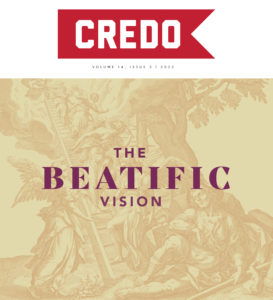
Beholding the Glory of God in the Face of Jesus Christ
I suspect that for many of us, the idea of spending time reflecting on the beatific vision might seem like a classic case of being so heavenly minded that we are of no earthly use. The way that the doctrine has traditionally been expressed doesn’t help. The tendency has been to focus on our glorified intellectual apprehension of the Triune God in ways that can seem highly abstract and overly cognitive. It can sound like we are simply going to be heavenly brains on sticks for all eternity, or contemplative souls without bodies. These days, many are rightly putting some serious question marks beside an all-but-disembodied idea of life in “heaven,” and recovering a more scripturally robust account of eternal life in our glorified resurrection bodies in the transformed physicality of the new creation. The problem with these accounts, though, is that God himself can often disappear from view. Our vision of life in the eschaton is so focused on ourselves and our activities that we end up displacing what scripture tells us is its white-hot center: beholding the glory of the Triune God, which draws us into ecstatic worship of God and inexpressibly glorious union and communion with him. This is what the doctrine of the beatific vision has always – and rightly – sought to point us towards. Our vision of life in the eschaton is so focused on ourselves and our activities that we end up displacing its white-hot center: beholding the glory of the Triune God. Click To Tweet
suspect that for many of us, the idea of spending time reflecting on the beatific vision might seem like a classic case of being so heavenly minded that we are of no earthly use. The way that the doctrine has traditionally been expressed doesn’t help. The tendency has been to focus on our glorified intellectual apprehension of the Triune God in ways that can seem highly abstract and overly cognitive. It can sound like we are simply going to be heavenly brains on sticks for all eternity, or contemplative souls without bodies. These days, many are rightly putting some serious question marks beside an all-but-disembodied idea of life in “heaven,” and recovering a more scripturally robust account of eternal life in our glorified resurrection bodies in the transformed physicality of the new creation. The problem with these accounts, though, is that God himself can often disappear from view. Our vision of life in the eschaton is so focused on ourselves and our activities that we end up displacing what scripture tells us is its white-hot center: beholding the glory of the Triune God, which draws us into ecstatic worship of God and inexpressibly glorious union and communion with him. This is what the doctrine of the beatific vision has always – and rightly – sought to point us towards. Our vision of life in the eschaton is so focused on ourselves and our activities that we end up displacing its white-hot center: beholding the glory of the Triune God. Click To Tweet
What if there were an account of the beatific vision that could help us to make clearer connections between what we will experience then and our ordinary life of discipleship now? And what if there were an account of the beatific vision that involved our glorified resurrection bodies as much as our minds, in a dynamic, never-ending “more and more-ness” of growing in knowledge, love, and blessedness in worship and adoration?
Owen’s Uphill Battle
Enter John Owen (1616 – 1683). He is amongst a handful of Reformed pastors and theologians who have reworked the traditional understanding of the beatific vision in a more fully scriptural and Christological direction. Perhaps you know Owen as a staunch defender of a “Calvinist” doctrine of election, or as someone who wrote on our communion with each person of the Trinity. He also reflected at length on the nature and importance of the beatific vision, especially in his monumental doctrinal treatise on the person and work of Christ (Christologia, 1679) and in his more pastoral and contemplative Meditations and Discourses on the Glory of Christ (1684), which was the last book Owen prepared for publication before he died. We have an account of how a friend brought him some page-proofs from the printer on what turned out to be the day of his death. On seeing them, Owen is said to have responded: “O Brother Payne! The long wished-for day is come at last, in which I shall see that glory in another manner than I have ever done or was capable of doing in this world.”Our vision of life in the eschaton is so focused on ourselves and our activities that we end up displacing what scripture tells us is its white-hot center: beholding the glory of the Triune God. Click To Tweet
Owen considered that there was very little more important for us than to behold the glory of Christ by faith now and by sight in the life to come, but he knew that he would have an uphill battle trying to persuade his readers of this. “Why on earth spend time reflecting on the beatific vision?!” is clearly one of the reactions he anticipated when he raised the subject. He expects that “Some will say they understand not these things, nor any concernment of their own in them. If they are true, yet are they notions which they may safely be without knowledge of; for so far as they can discern, they have no influence on Christian practice or duties of morality…but take the minds of men from more necessary duties” (305). In other words, many will insist that reflecting on the glory of Christ is too obscure and too irrelevant to daily life, and therefore a distracting waste of time. It might be what we will do in heaven, but there are better things to be doing here on earth. The very few who might give it a passing thought do just that, says Owen– they only give it a passing thought, because they consider such reflections and meditations too hard going: “thoughts of this glory…are too high for us, or too hard for us, such as we cannot long delight in” (304).
He makes it clear, though, that thinking about what will constitute the beatific vision is not simply an added extra for the hyper-pious with a good deal of time on their hands. It is a theologically, scripturally, spiritually, soteriologically vital thing to be doing. As far as he is concerned, all evangelical, Reformed Christians should have their whole Christian life and thinking oriented towards the hope of the beatific vision and shaped by the foretaste we receive of it here and now. He urges us to make reflection on the glory of God in the face of Christ by faith now a central part of our “spirituality,” to use a more contemporary term, because he considers this to be a scripturally mandated means of God’s saving and transforming work in our lives. Second Corinthians 3:18 and 4:6 play a particularly important role in this regard. The Christological and pneumatological dynamic of the Christian life here and now, and of our eternal salvation, is there in a nutshell. We are to be conformed by the Spirit more and more to Christ the image of God, and one of the chief ways in which we are formed and transformed (and our minds are renewed, to insert a little of Romans 12 into the context of 2 Corinthians) is by beholding the glory of the Lord, now partially and by faith, and then by sight at the eschatological consummation. There is a soteriological trajectory and a transformational continuum between beholding the glory of God in Christ by faith now and beholding it by sight in eternity.To put it bluntly (and John Owen frequently does), you cannot expect to enjoy the consummation in heaven of what you have shown no interest in whatsoever here. Click To Tweet
To put it bluntly (and Owen frequently does), you cannot expect to enjoy the consummation in heaven of what you have shown no interest in whatsoever here. In his words, “No man shall ever behold the glory of Christ by sight hereafter who doth not in some measure behold it by faith here in this world. Grace is a necessary preparation for glory, and faith for sight. Where the…soul is not previously seasoned with grace and faith, it is not capable of glory or vision…” (288). For this reason, Owen summons us to a life of spiritual apprenticeship. He points out that we “are not so vain as to hope for skill and understanding in the mystery of a secular art or trade without the diligent use of those means whereby it may be attained; and shall we suppose that we may be furnished with spiritual skill and wisdom in this sacred mystery [beholding the glory of God] without diligence in the use of the means appointed of God for the attaining of it?”(306).
This excerpt is from the latest issue of Credo Magazine. Read the full article here!

